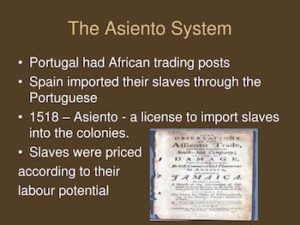
*On this date in 1518, we recall the Asiento system. This was the African slave-selling license issued by the Portuguese and Spanish crown, allowing merchants to monopolize a trade route or merchandise.
Portugal owned the trading post that held Black people, and Spain arranged their routing and distribution through their control of the Caribbean. The first asiento for selling slaves was drawn up in 1518, granting Laurent de Gouvenot a monopoly on importing enslaved Africans for eight years with a maximum of 4,000. Gouvenot promptly sold his license to Genoese merchants in Andalusia for 25,000 ducats. The crown controlled trade and immigration to the Americas (New World), excluding Jews, conversos, Muslims, and foreigners.
African slaves were considered merchandise, and the crown regulated their imports. Spain had neither direct access to the African sources of slaves nor the ability to transport them, so the asiento system was a way to ensure a legal supply of Africans to the New World, which brought revenue to the Spanish crown. The asiento was included in some peace treaties. An example was the fee payment, granting legal permission to sell a fixed number of enslaved Africans in the Spanish colonies. They were usually sold to foreigners, mainly Portuguese. They were also considered a tangible asset, comparable to tax farming, and a source of profit for the Spanish crown. The original impetus to import enslaved Africans was to relieve the colonies' indigenous inhabitants of the colonies from the labor demands of the Spanish colonists.
Dutch merchants also became involved in the slave trade. In 1713, the British were awarded the right to the asiento in the Treaty of Utrecht, which ended the War of the Spanish Succession. The British government passed its rights to the South Sea Company. The British asiento ended in 1728 when José Lopez da Moura, an Afro-Portuguese competitor in the slave trade, raided Bance Island. This partly created the 1750 Treaty of Madrid between Great Britain and Spain. In Spain, the asientos of the Genoveses (enemies of the Crown of Aragon) and later of the so-called Marranos or Portuguese Jews stood out.
In many cases, intra-nationally, a seat in the form of financing in the case of economies of scale resulted in a chartered commercial company whose activities enjoyed the protection of the State. This special privilege did not always constitute a total monopoly. Its existence dates back to the 14th century in Italy, highlighting the British East India Company, The Royal African Company, the Dutch West India Company, or the Casa de la Contratación de Indias in Seville.